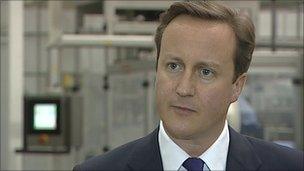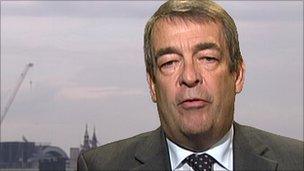David Cameron says tax breaks will help West Midlands
- Published

The deficit is the biggest threat to the economy, the prime minister said
Encouraging the private sector to grow is the way to encourage manufacturing firms to the West Midlands, the prime minister has said.
David Cameron was speaking during a visit to BBC Birmingham where he was asked how he would get the West Midlands economy growing.
He said cutting corporation tax would encourage businesses to relocate to areas such as the West Midlands.
He added decisions had to be taken to protect the economy's infrastructure.
The West Midlands has been hit by manufacturing job losses and closures in recent years, most notably in the motor industry such as Jaguar Land Rover and the closure of MG Rover in Longbridge in 2005.
Mr Cameron said: "The deficit is what threatens our economy and by dealing with it, as we are now, we can get confidence back, we can get growth back, we can get jobs back."
"I think the greatest danger would be doing nothing, you can see other countries in the European Union in real problems because they haven't got on top of their deficits," he added.
Richard Burden, Labour MP for Birmingham Northfield, said: "Of course there were going to be difficult decisions to make whichever party got in
"But the fact is David Cameron's government is making the wrong decisions at the wrong time and on the wrong scale."
John Russell, chairman of the West Midlands CBI, said he agreed with the prime minister's general message.

The regional development agency has to be replaced, Mr Russell said
"I think the general policy agenda is one that does support growth in the private sector," he added.
Mr Russell, who is also the chief executive of Manganese Bronze Holdings, which makes London black cabs, said: "I think in the West Midlands we have a very specific problem, that the regional development agency is being disbanded and we need a new structure put in place to pick up the work of that organisation.
He said the main problem was the unsustainable deficit.
"We can have debates about whether we get to grips with that in six months or now, but I think the fundamental problem still remains - we need to get public sector spending under control and reduce it," he added.
- Published2 August 2010